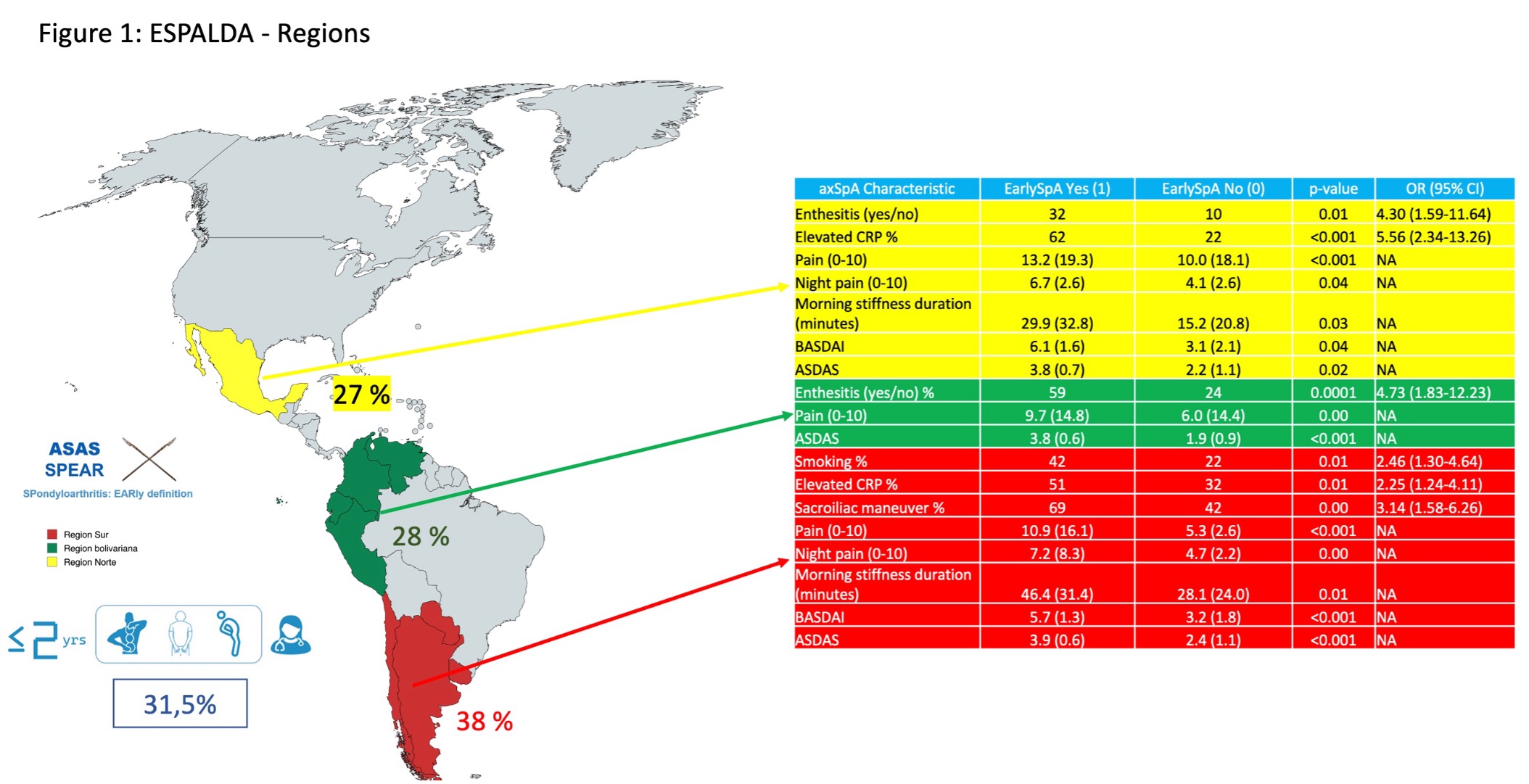Session Information
Session Type: Poster Session C
Session Time: 10:30AM-12:30PM
Background/Purpose: The ESPALDA registry, developed by PANLAR, collects data from Latin America to better understand the clinical and epidemiological characteristics of patients with axial spondyloarthritis (axSpA). This analysis focuses on early axSpA, defined by ASAS criteria as a duration from the onset of back pain to diagnosis of less than two years, across the entire cohort and by region.
Methods: Patients aged ≥18 years meeting the ASAS 2009 criteria for axSpA were included. Data were collected from medical centers in nine LATAM countries. Baseline data included demographics, disease duration, clinical manifestations, comorbidities, disease activity (ASDAS, BASDAI), functionality (BASFI), laboratory tests (ESR, CRP, HLA-B27), and imaging (X-ray, MRI). Regions were categorized as South (Argentina, Chile, Uruguay, Paraguay), Andean (Colombia, Peru, Venezuela, Ecuador), and North (Mexico). Descriptive statistics and comparative analyses were performed using Chi-square tests and parametric or non-parametric methods as appropriate. Multivariable analysis was performed.
Results: In 419 patients, the prevalence of early axSpA was 31.49% (95% CI: 27.31% – 36.01%). Regional differences in prevalence were observed: South (38.19%), Andean (28.42%), and North (27.42%) (p=0.07). Differential characteristics of the entire cohort are detailed in Table 1. Multivariable analysis identified key factors positively associated with early axSpA: ASDAS high disease activity (HDA, OR = 17.808, 95% CI: 2.446 – 129.645, p=0.004) and BASDAI ≥4 (OR = 44.378, 95% CI: 4.943 – 398.394, p=0.001). Regional analyses highlighted distinct characteristics among early axSpA patients: South: Smoking (OR = 2.46, 95% CI: 1.30-4.64, p=0.01), positive sacroiliac maneuver (OR = 3.14, 95% CI: 1.58-6.26, p< 0.001), elevated CRP (OR = 2.25, 95% CI: 1.24-4.11, p=0.01), BASDAI (p< 0.001), and prolonged morning stiffness (p=0.01) were significantly associated. Andean: Enthesitis (OR = 4.73, 95% CI: 1.83-12.23, p< 0.001) was a key feature, while elevated CRP showed marginal significance (OR = 2.79, 95% CI: 1.02-7.62, p=0.08). North: Enthesitis (OR = 4.30, 95% CI: 1.59-11.64, p=0.01), elevated CRP (OR = 5.56, 95% CI: 2.34-13.26, p< 0.001), BASDAI (p=0.04), and prolonged morning stiffness (p=0.03) were highly distinctive, all variables in fig 1.
Conclusion: The ESPALDA registry highlights significant regional variations in early axSpA characteristics across LATAM.
To cite this abstract in AMA style:
bautista molano W, Guaracha G, Sommerfleck F, García Salinas R, Casasola Vargas J, Londono J, Fernandez D, Vila D, Brance L, Then J, Zeballos f, Macias L, mestanza M, Sanchez D, chincháy l, Melgarejo P, Castillo A, Gomez G, ferreryra L, candia D, medina G, Erguez M, Sanchez E, Palleiro D. Early Axial Spondyloarthritis in Latin America: Prevalence and Regional Differences from the “ESPALDA” Multinational Registry [abstract]. Arthritis Rheumatol. 2025; 77 (suppl 9). https://acrabstracts.org/abstract/early-axial-spondyloarthritis-in-latin-america-prevalence-and-regional-differences-from-the-espalda-multinational-registry/. Accessed .« Back to ACR Convergence 2025
ACR Meeting Abstracts - https://acrabstracts.org/abstract/early-axial-spondyloarthritis-in-latin-america-prevalence-and-regional-differences-from-the-espalda-multinational-registry/


.jpg)